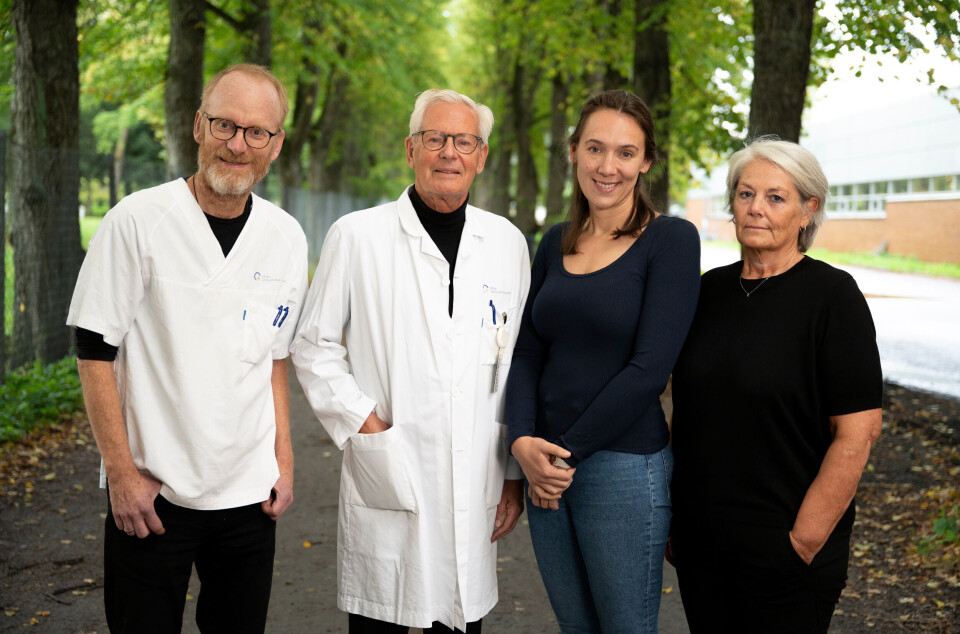THIS CONTENT IS BROUGHT TO YOU BY University of Oslo - read more

Research breakthrough: Antiviral medication could be used to treat children with type 1 diabetes
New research shows that treatment with antiviral drugs could help preserve insulin levels among children with type 1 diabetes. The result shows that it is possible to slow down and eventually prevent type 1 diabetes.
In type 1 diabetes, the pancreas gradually stops producing insulin, a hormone that regulates the body's blood sugar levels. The body needs insulin to convert sugar into energy.
When insulin production stops, you become completely dependent on injecting insulin into your body yourself. This means that a process that your body does automatically becomes something you must actively monitor and manage for the rest of your life.
New research shows that antivirus drugs preserve insulin in children
In an international research breakthrough, Norwegian scientists have shown that they are able to reduce some of the loss of insulin production in the body. They did this by administering antivirus medication to children and adolescents with newly diagnosed type 1 diabetes.
The study was conducted by a research group at the pediatric clinic at Oslo University Hospital (OUS) and the University of Oslo (UiO).
“The finding largely shows that a virus triggers type 1 diabetes in children,” says Knut Dahl-Jørgensen, a senior physician at OUS and Senior Professor at UiO, who led the study.
"This indicates that it will be possible to treat and slow down type 1 diabetes with medication. Perhaps eventually even prevent the disease," he adds.

A completely new concept for treating type 1 diabetes
“This is a potential new concept for the treatment of type 1 diabetes. No other research groups have done this before,” Lars Krogvold, senior physician at OUS, says.
The study is published in the renowned journal Nature Medicine. First authors are Lars Krogvold and PhD student Ida Mynarek.
Enterovirus causes chronic infection in the pancreas
The researchers have previously demonstrated a clinically significant association between enterovirus infection and the onset of type 1 diabetes.
They detected a chronic viral infection in the pancreas tissue where insulin is produced in patients with newly diagnosed type 1 diabetes.
“We have previously demonstrated a group of viruses called enterovirus, in patients recently diagnosed with type 1 diabetes. We found an enterovirus infection in the pancreas of all the patients we examined,” Dahl-Jørgensen explains.
Enterovirus are very common viruses that can cause both respiratory infections and gastrointestinal illnesses.
The cells' capacity to produce insulin are destroyed
However, enterovirus does not usually belong in the pancreas. How do these viruses end up there, and how can they cause diabetes?
The researchers believe that some individuals are more vulnerable to establish a low-grade chronic enterovirus infection than others. Over the past ten years, they have studied tissue samples from the pancreas in international laboratories.
"We have described a cascade of different mechanisms that we believe are destroying the cells, triggered by the viral infection," Dahl-Jørgensen explains, adding:
"The enterovirus creates a low-grade or slow-growing chronic infection in the insulin-producing tissues in the pancreas. The immune system reacts to the virus by attacking the cells. This destroys the cells’ capacity to produce the vital hormone insulin."
Patients received either antiviral medication or a placebo
The researchers wanted to investigate the association between enterovirus and type 1 diabetes more closely. They wanted to determine the effect of antiviral treatment on insulin production in children and adolescents newly diagnosed with type 1 diabetes.
They conducted a randomised, controlled trial in which 96 children aged 6-16 with newly diagnosed type 1 diabetes, were randomly assigned to one of two groups.
One group received treatment with two antiviral medications, pleconaril and ribavirin, for six months. The other group received a placebo, a treatment with no active ingredients. The patients started treatment immediately after being diagnosed.
The researchers then compared the two groups.
Higher levels of insulin in patients who received medication
After one year, the researchers measured the patients’ insulin production.
"The level of insulin production in the body was found to be significantly higher in the group that received antiviral medication compared to the group that received the placebo," Dahl-Jørgensen says.
This indicates that the antiviral treatment slows down the progression of type 1 diabetes.
Why is it important for patients to preserve their insulin production?
Type 1 diabetes is a serious disease. No cure exists and there is nothing we can to do prevent it, yet.
The disease can lead to long-term complications, such as blindness, amputations, kidney failure, heart attacks, and a reduced lifespan.
"If we can stop the virus before it destroys all the insulin-producing cells, patients will have a much milder disease to manage. They will have more stable blood sugar levels and may also have fewer serious complications in the long run," the Professor says.
Type 1 diabetes may be prevented
The researchers want to investigate further if antiviral medications are more effective on their own or when combined with medications that inhibit inflammation and strengthen the insulin-producing cells.
"Further studies are needed to confirm these results and optimize treatment with antiviral medications. We strongly believe that a combination therapy with different medications will have an even greater effect," Krogvold says.
"The ultimate goal is to prevent and cure type 1 diabetes," he adds.
Can a vaccine prevent type 1 diabetes in the future?
In addition, the researchers will continue with their research and investigate whether antiviral medication also has an effect at an earlier stage in the disease process. Perhaps it can prevent people with prediabetes from developing the disease?
"Prediabetes has no symptoms but can be detected by measuring specific antibodies in the blood," Krogvold explains.
In the long term, the researchers hope it will be possible to develop a vaccine against type 1 diabetes.
Their research collaborators in Finland have developed a protein-based vaccine against enterovirus. This vaccine will now be tested to see if it can prevent type 1 diabetes.
Reference:
Krogvold et al. Pleconaril and ribavirin in new-onset type 1 diabetes: a phase 2 randomized trial, Nature Medicine, 2023. DOI: 10.1038/s41591-023-02576-1

This content is paid for and presented by the University of Oslo
This content is created by the University of Oslo's communication staff, who use this platform to communicate science and share results from research with the public. The University of Oslo is one of more than 80 owners of ScienceNorway.no. Read more here.
More content from the University of Oslo:
-
Where humans outshine AI: “There's something hopeful in these findings”
-
Why we need a national space weather forecast
-
Mainland Europe’s largest glacier may be halved by 2100
-
AI makes fake news more credible
-
What do our brains learn from surprises?
-
"A photograph is not automatically either true or false. It's a rhetorical device"





































